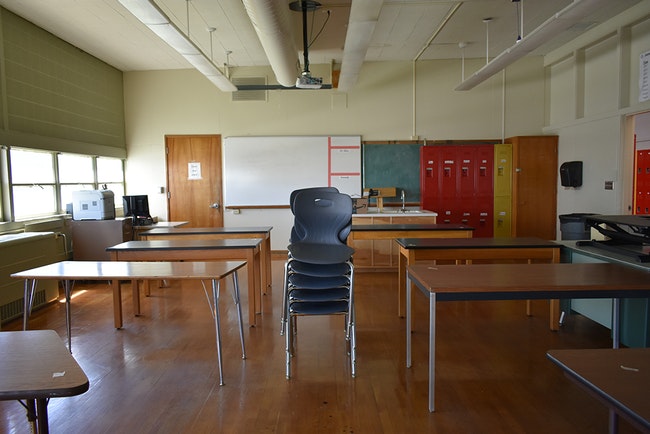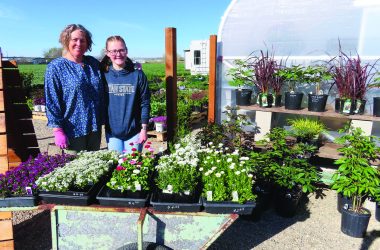
Locals who responded to the Enterprise’s School survey expressed concerns about how distance learning affected their children’s schooling. (The Enterprise/Rachel Parsons)
Malheur County’s school children didn’t get good schooling and fell behind last spring, according to a majority of those responding to the Malheur Enterprise’s recent school survey.
A majority think it’s safe to return kids to the classroom but the opinion is split about whether to do so. Half those responding support a full return to the classroom while half want to continue distance learning or a blend of classroom and virtual teaching.
Nearly 300 people responded to the online survey, which is not a scientific poll. About half the respondents listed themselves as in the Ontario School District, with 19% from Vale, 14% from Nyssa and 8% from Adrian.
The survey revealed deep concerns about the impact of the abrupt closure of schools last March. Gov. Kate Brown ordered the closure as the coronavirus rapidly spread through Oregon. Local school districts adjusted by trying to provide teaching over the internet. The survey suggests that didn’t go well for most Malheur County children.
Most school districts are opening the 2020-21 school year by again resorting to distance learning. Small school systems such as Jordan Valley and Arock were allowed to return to normal schooling because of their isolation from the virus.
Other schools can provide in-school classes to a limited number of students, but a full return to the classroom won’t happen until Malheur County’s Covid infection rate drops dramatically.
Key findings from the survey:
• Nearly 7 out of 10 respondents said schooling in the spring was “poor” or “not so good” while about 3 out of 10 said it was “good” or “excellent.”
• Nearly 6 out of 10 said their children were “behind” as a result of distance schooling in the spring.
• Nearly 6 out of 10 said their children were “not very engaged” in school work last spring while 3 out of 10 said their children were “appropriately engaged.”
• About 5 out of 10 said sending kids to classrooms now would be “safe” or “very safe” while 4 out of 10 said such a move would be “not very safe.”
• 6 out of 10 said they would support a requirement that children wear masks while in school.
Local school officials generally agreed with the survey findings.
“Last spring’s schooling was not up to the standard we wanted for our students,” said Darren Johnson, Nyssa School District superintendent.
He said the district identified the weaknesses and worked ahead of this school year to improve.
“Though far from perfect, we have the supports in place – technology, connectivity, tech support, curriculum, and personnel – to make sure students are being taught each day and having a strong school experience.”
The fast turn to distance learning caught Vale as well.
“We did not have time to thoroughly prepare for distance learning or acquire the resources and technology to successfully implement distance learning,” said Alisha McBride, Vale School District superintendent. “However, we learned a lot last spring and have been able to make changes to improve distance learning this fall.”
Chelle Robins, superintendent of Four Rivers Community School, said she is “concerned about students falling behind. We don’t have a good measure of this at this point, but will be doing some one-on-one assessments soon in the lower grades.”
“It is likely that there are going to be some learning gaps that need to be addressed,” McBride said. “Our educators are aware of this and will be making adjustments to instruction, as necessary, to address the gaps.”
A continuing concern among parents, educators and health professionals is the impact of the coronavirus and virtual schooling on the mental health of children.
In the survey, respondents were split. About half thought their children’s mental wellbeing was the same or better than six months ago. The other half said their children’s wellbeing was “worse” or “far worse.”
“Our kids are struggling with depression due to lack of socializing,” one respondent wrote.
“Our children’s mental health is suffering tremendously, and I’m thankful that I have the resources to help my son through this craziness,” wrote another.
Survey respondents were afforded a chance to leave comments without identifying themselves.
Robins said she is “very concerned” about students’ mental health.
“Teachers are skilled at watching for patterns of decline and engagement with students throughout the school year when they are teaching in-person. Distance learning makes this extremely difficult because teachers have students for such a limited time and cannot watch for patterns of concern, body language, physical appearance, etc.,” she said. “Our dean of students and counselors will be working with students remotely in the best way they can to support students that may already be on our radar. The concern is the students that may be really struggling with feelings of isolation and other issues related to the pandemic that we are not aware of.”
Johnson has similar concerns for his Nyssa students.
“Many students need to have emotional support, and we are very vigilant in having our counselors at each school reach out to students who have needed it in the past, those who are identified by teachers as needing it currently, and offering mental health services to all students and families,” Johnson said.
McBride said nearly every Vale family attended school meetings recently to prepare for the new year.
“Our schools and staff provide students with more than just academic support. We also provide students and families with structure, safety, meals, and mental health support. Providing these services is much more difficult through a distance learning format,” she said.
Parents and educators worry about the impact of continuing to teach from a distance.
“I realize there are safety concerns, some real and some government mandated, but I don’t feel like the trade-off should be our students receiving an entire year of very limited education,” said Jason Lamb, a Nyssa High School teacher. “The impact of this could negatively affect our students, our community, and our country for the rest of our students’ lives.”
“We’re staying home. We’re wearing our masks,” said Renae Davenport, who lives in the Ontario School District. “My student won’t be returning to school until I feel safe sending him; and that doesn’t look like anytime soon, sadly.”
Parents and others said politics clouded the issue of education, particularly arguments over mask mandates across Malheur County.
“It seems most our community is divided over mask wearing, and returning to school, and everything in between,” said Davenport. “Masks aren’t a political issue. It’s a matter of caring about your community and every life in it for us. We’ve already nearly lost a friend to COVID locally, and that was a wakeup call.”
Misty Parent, who has a senior at Ontario High School, said rather than making the virus a political issue, “we must make it us against the virus.”
Zach Olson, a parent with children in Nyssa schools, said the governor “seems to think we can all just stuff our kids in the closet until the pandemic is over. Working parents cannot do that. We are desperately trying to band together to essentially form alternative school arrangements, which in many cases are going to be more dangerous than what schools had planned.”
Olson said he doesn’t expect the coronavirus situation in Malheur County to improve soon.
“Our neighboring states have similar or worse outbreaks and experts are expecting things to be worse in the fall and winter,” Olson said. “We are not even doing smart things to lower our numbers. The pot shops and bars are all open, while our outdoor splash pad is closed. It is bonkers.”
The survey revealed impacts on families beyond educating students.
Four out of 10 respondents said they would have to reduce their work hours or lose their job because their children were learning at home instead of in school. About one-third of the respondents said they would rely on others for child care and another third said that distance learning wouldn’t no impact on their employment.
But respondents also said they need help to provide schooling at home for their children.
The most significant need was “help keeping my children engaged in lessons” (65% picked this need) and “tips for helping my children with school work” (43%).
“It would be nice if parents would be trained on what ‘distance learning’ looks like, and how to use technology,” one survey respondent wrote.
One-fourth of the respondents said they need “more income for necessities” or “paid time off from work.”
PRIOR COVERAGE
Nyssa students go to class, at home
Malheur County educators share advice to keep kids engaged in long-distance schooling
New report shows state taking conservative path to classrooms
Contact Editor Les Zaitz by email at [email protected].
YOU CAN HELP KEEP LOCAL NEWS FLOWING: Reader support allows the Enterprise to provide in-depth, accurate reporting that otherwise would not get done. Keeping the community well informed is essential. SUBSCRIBE – $5 a month, automatically. DONATE – to provide additional support.




